Speed Learning for Kids
The Must-Have Brain-Training Tools to Succeed at School
BILL HANDLEY
First published in 2013 by Wrightbooks an imprint of John Wiley & Sons Australia, Ltd
42 McDougall St, Milton Qld 4064
Ofce also in Melbourne
Typeset in Trump Mediaevel-Roman, 11pt
Learning Unlimited Australia Pty Ltd 2013
The moral rights of the author have been asserted
National Library of Australia Cataloguing-in-Publication data:
Author: Handley, Bill.
Title:Speed learning for kids: the must-have brain-training tools to succeed at school/Bill Handley.
ISBN: 9780730377191 (pbk.)
Notes: Includes index.
Subjects: Learning.
Effective teaching.
Educational innovations.
Educational change.
Dewey Number:371.102
All rights reserved. Except as permitted under the Australian Copyright Act 1968 (for example, a fair dealing for the purposes of study, research, criticism or review), no part of this book may be reproduced, stored in a retrieval system, communicated or transmitted in any form or by any means without prior written permission. All inquiries should be made to the publisher at the address above.
Cover design by: C. Wallace
Cover image: iStockphoto.com/Nicole S. Young
Internal design: Peter Reardon, pipelinedesign.com.au
Silhouettes: allsilhouettes.com
Examples in chapter 6 adapted from Brain Stretchers by Eugene Raudsepp
Printed in China by Printplus Limited
10 9 8 7 6 5 4 3 2 1
Disclaimer
The material in this publication is of the nature of general comment only, and does not represent professional advice. It is not intended to provide specific guidance for particular circumstances and it should not be relied on as the basis for any decision to take action or not take action on any matter which it covers. Readers should obtain professional advice where appropriate, before making any such decision. To the maximum extent permitted by law, the author and publisher disclaim all responsibility and liability to any person, arising directly or indirectly from any person taking or not taking action based on the information in this publication.
Acknowledgements
I owe so much to so many for the existence of this book.
First, Geoff Wright, founder of Wrightbooks, who phoned me after a radio interview and said, Write a book and I will publish it. He was prepared to take a risk and it paid off. Thank you Geoff.
Thank you also to Geoffs daughter, Lesley Beaumont, who gave me heaps of guidance, advice and encouragement with my earlier books.
Thank you to the educators around the world and to the lecturers at teachers college who have encouraged me and helped me along the way.
I would like to thank the people at Wiley directly connected with this book. I would like to thank Lucy Raymond, Meryl Potter, Elizabeth Whiley and Keira de Hoog. They have all played an important part in the preparation of this book. There are so many others at Wiley who deserve thanks. I am grateful for your support.
I would like to dedicate this book to my grandchildren and to students everywhere.
 Introduction
Introduction
When I was about six or seven years old, my father took a special training course related to his work. His method of consolidating what he had learned was to come home and teach me his summary of the training program for that day. Although I was very young, I still understood most of what he told me. (Or I thought I did.) One evening he came home and told me that, instead of the regular training program, they had a special lecture on how to learn effectively. He explained how you have to link the new information to information you already know. If the connection is strange, crazy or even a bit risqu, all the better. I never forgot this, and used the basic strategy all through school and college especially for cramming before exams. When my father asked me where I got the idea for my study methods, I told him he had taught me when I was about six years old. He said he remembered the course and teaching me at night, but he couldnt remember anything about the lecture on study methods (or even doing it), and he told me he had never used any of the methods himself.
In 1979 I developed my methods further and couldnt believe the results. I was so excited I had to tell someone. I told a friend who was also studying, and he became excited and asked if I would teach a group of his friends. They were able to start using the methods immediately. I was encouraged by my lecturers at teachers college to further improve my methods and to see how they worked in the classroom.
I conducted special classes for gifted students as well as students who were considered unteachable at the secondary school where I was teaching. After two months it was impossible to tell which class was which. This was reported in a local newspaper and resulted in a mother writing to me from New Zealand, asking if I could help her nine-year-old daughter who was terrified of maths. I recorded a cassette lesson and typed some notes and mailed them to her. She wrote back that her daughter had immediately played the tape and there was an immediate improvement in her maths. I made recordings of my other methods for study and literacy and had them professionally printed and packaged.
I received invitations to teach my methods to teachers and students around Australia, and then around the world, and I have continued to write about and teach them to this day.
How to learn effectively
During the first years of our life we learn at an incredible rate. We make our entry into the world knowing nothing absolutely nothing. We dont know what or who we are or what anything else is. We find we can see and we can hear, but we have no idea what anything means we cant make sense of anything. We soon learn to recognise people, sounds and our surroundings. We begin to make sense of it all.
Consider how quickly we learn our first language. We are able to get by and make our wishes known in a very short time. Then we learn how to express ourselves properly and speak about a variety of subjects.
Toddlers are desperate to learn and they are full of questions. They are always asking why, why, why? Their minds are like sponges, soaking up information.
School changes that. When we begin school we learn a whole lot of rules and our learning and our thinking become regimented. Teachers decide what we will learn, and when, and how we will learn it. Our questions can go unanswered if it doesnt suit the teachers lesson plan. We are told to wait, and often we will never follow up our questions.
We are told what we have to learn but no one teaches us how to learn. We are left to work that out for ourselves. We are told to pay attention, try harder, concentrate. But nobody tells us how to do any of those things. How are we supposed to try harder? How do we concentrate on something we dont understand?
Children will punch the side of their heads to show they are trying, but it only succeeds in giving them a headache. They need someone to teach them how to learn. They would like to try harder, but nobody explains how to go about it. Too often they get discouraged and simply give up; they feel they lack the intelligence to learn in the way they are expected to.
Some students develop effective learning methods for themselves and seem to learn easily and well. They soon develop a reputation for being intelligent and fast learners. Others adopt very complicated and inefficient methods. Generally speaking, it is the methods we use that determine our learning ability rather than the quality of the brain we were born with. We can all greatly improve our ability to learn and to process information. This book will guide you through an effective learning process that will deliver unbelievable results.



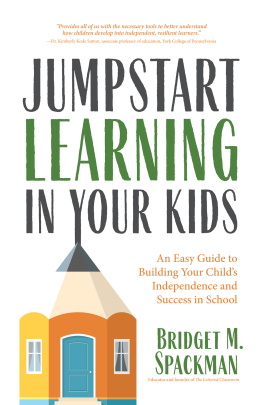
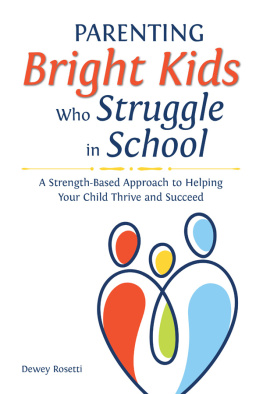
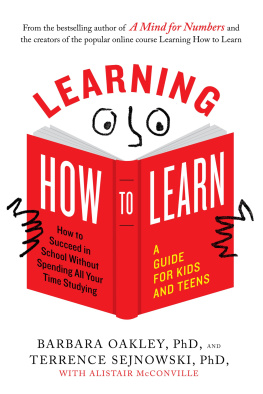
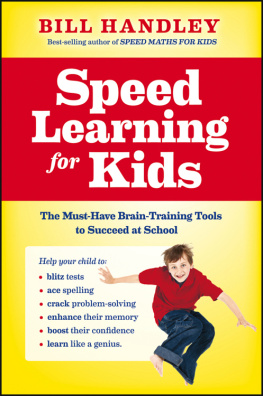
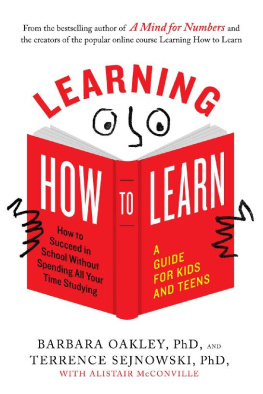
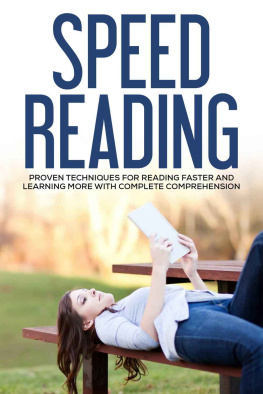
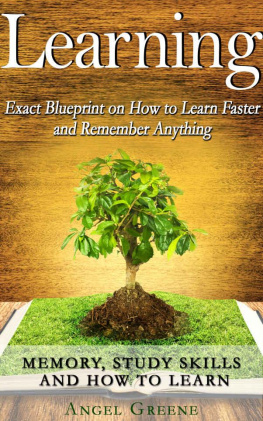
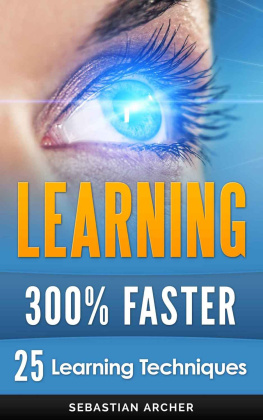
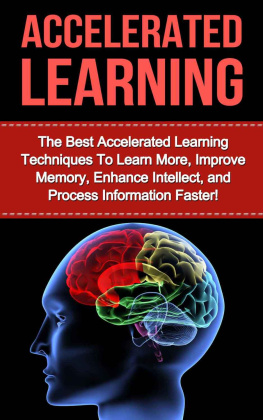
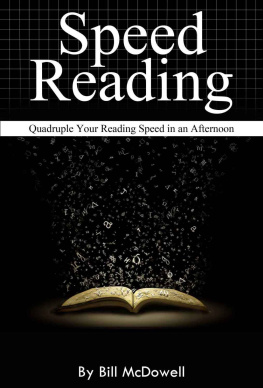
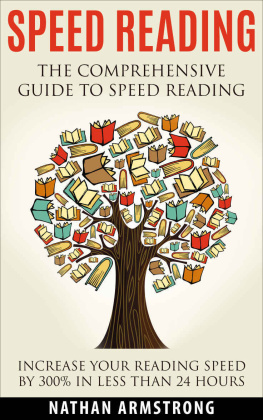


 Introduction
Introduction